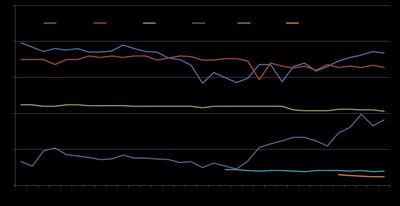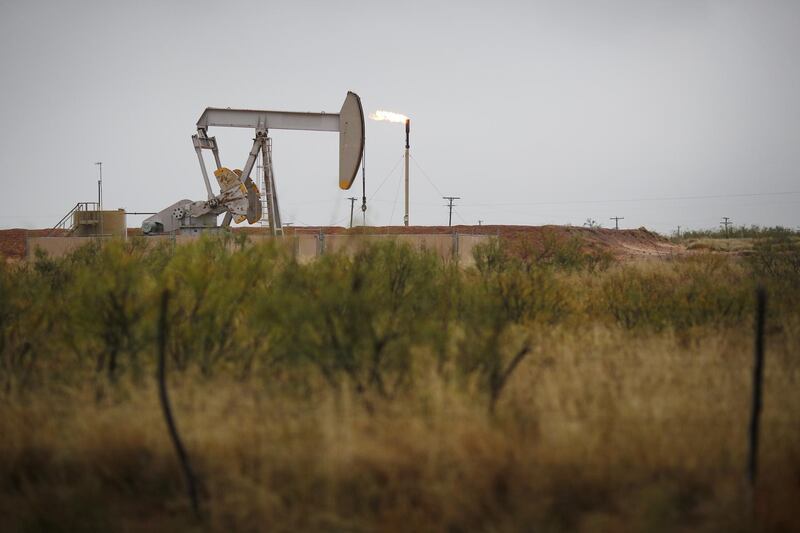VIENNA // Opec has an eye on Africa - the group has invited an eclectic bunch of sub-Saharan nations including Ghana, Congo-Brazzaville and Chad to observe this week's meeting.
Their presence on the sidelines of the gathering is welcome but it won't help solve the biggest challenge facing the 14-member club of major producers - how to reassert supremacy in the oil market.
Hammering out a new deal with 10 non-Opec producers including Russia remains the top priority. Oil prices may have recovered by about 50 per cent to around US$63 per barrel over the past year but progress has been arduous. Failure to extend their pact limiting output by a combined 1.8 million barrels per day (bpd) deeper into next year could also have disastrous consequences. As oil ministers arrived in Vienna, Citi's respected analyst Ed Morse told S&P Global Platts prices could slump by $8 per barrel if no new agreement is reached by Thursday.
The stakes are high for all involved. According to the IMF, the majority of Gulf Arab producers require prices well above $60 per barrel to balance their budgets but for the smaller African countries in attendance the consequences of no deal could be catastrophic. Without the benefit of deep foreign reserves, or sovereign wealth funds, to fall back on these nations with their fragile economies could be the biggest losers from a breakdown in talks over which they have very little influence.
However, Opec's inability to rebalance markets on its own without the help of outsiders has also opened up an opportunity for smaller African oil producers. Sub-Saharan countries invited to attend such as Chad, Ghana, Cameroon, Mauritania and Cote d'Ivoire with combined production of around 600,000 bpd - less than the UK pumps from its ageing wells in the North Sea - now have their first chance to influence global oil policy. Uganda - which is also at this week's meetings - doesn't even produce. It plans to start pumping around 220,000 bpd from 2020 onwards from its Lake Albert fields.
"It gives us a voice," the Equatorial Guinean minister of mines, Industry and energy Gabriel Obiang Lima said in a recent interview with S&P Global Platts in Cape Town. “We do have the belief that joining Opec has been a good thing. It has definitely provided us with information that otherwise we would not have had but also joining Opec and joining this new initiative has achieved what we wanted, which was to stabilise the oil price. Any new ideas that will maintain this stabilisation will be welcomed by the government.”
Equatorial Guinea is typical of the small African producers now finding a place within the group, which pumps a third of the world's crude. The tiny West African state is barely producing 130,000 bpd from its ageing and technically challenging fields. Joining Opec officially as its 14th member in May, output at around 130,000 bpd has been capped as part of the existing deal to drain global stockpiles, which could expire in March next year. But, like many of the sub-Saharan states now on the fringes of Opec, it now has big plans to double output in the coming years, which could be waylaid by quotas.
____________
Read more:
S&P raises 2018 Brent oil price forecast on ongoing cuts and strong demand
Emerging markets offer appeal to well prepared investors
Venezuela’s state oil producer tells staff to cut costs by 50%
____________
“The advantage of membership could be minor producers are exposed to the thinking of the big producers,” said the senior energy research fellow at the London-based international affairs think tank Chatham House Valerie Marcel. "But there are more negatives to consider: their production might be curtailed when they could free-ride and they won’t have a loud voice in Vienna to influence that decision."
For Opec's core members from the Middle East such as Saudi Arabia, expanding into Africa is also about developing stronger political and economic ties with new markets with rapidly growing populations.
Africa's demand for energy is expected to surge. According to BP, total energy demand on the continent will grow by 75 per cent between 2015 and 2035, over twice the rate of expansion expected from the rest of the world. Oil will also a key part of the region's energy mix, accounting for a third of total energy consumption. Much of this crude will be produced domestically. BP estimates that export volumes of around 5 million bpd from the region will more than halve by 2035.
Of course, African nations are already playing a role within Opec. Nigeria, Libya, Angola, Algeria, Gabon and Equatorial Guinea account for close to 6 million bpd of the group's total output of around 32 million bpd. The Opec secretary general Mohammed Barkindo - a former Nigerian oil minister - has also made African expansion his pet project since taking over in 2016.
However, the influence these nations have is limited and has failed to counterbalance Opec's losing battle with the growing power of US shale producers in the market. Libya and Nigeria - among the region's largest producers - have also been exempted from cuts but pressure is mounting to bring them under quotas.
But, even if these limits on output are applied, they won't be enough to move the dial on prices significantly. African producers want a voice in Opec but they can barely afford to put their barrels on the line to support its policies.
* with Eklavya Gupte
Andy Critchlow is the head of energy news, EMEA at S&P Global Platts







